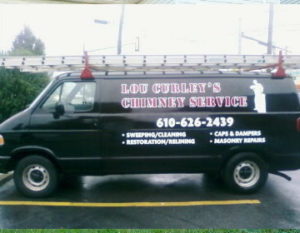 Those two little words carry a plethora of possibilities. Damage to a chimney may be internal, external, or both. It may include replacement of the flue, replacement of some of the masonry, or an entirely new build if damage is bad enough.
Those two little words carry a plethora of possibilities. Damage to a chimney may be internal, external, or both. It may include replacement of the flue, replacement of some of the masonry, or an entirely new build if damage is bad enough.
Repairing your chimney could be a quick fix, or it could be a process that requires an entire day to complete. Today I’ll talk primarily about elemental damage and how a yearly inspection can help you prevent very costly repairs over time.
Basic Repair and Maintenance
The first thing you need to do is seal the fireplace opening. Creosote and soot are not easy to clean off of rugs, upholstery, or any other surface, really.
Next, inspect the damaged area that needs attention. Decide whether you want to tackle those damages yourself or hire a professional chimney repairman.
Clean away all debris so you can get a better look at potential damage. Creosote is very difficult to get rid of; you’ll need a chimney brush. After cleaning, thoroughly inspect for damages.
Masonry Chimney Cracks
Masonry chimneys are bad to hold water due to water collecting in the brick and mortar. Waterproofing your chimney helps prevent this problem. Water that is allowed to remain in the chimney can swell and contract, creating situations which lead to cracks in the mortar or even broken bricks.
Repairing your brick and mortar chimney can be taken on as a DIY project. Don’t get me wrong, it isn’t easy work, but it is doable in a weekend for those who enjoy the challenges of DIY projects and want to try to save money on chimney repairs.
Make sure to repair these items as needed: chimney structure, the crown, and the flashing. Repairing the mortar between brick or rock is as simple as filling the cracks with mortar.
Lastly, waterproof your chimney with a reliable waterproofing agent. The best waterproofing agents carry a warranty and do not dry with a glossy finish.
Avoid Future Chimney Problems
Make sure to inspect your chimney at least once a year for obvious damage. If you see a change or potential damage, call a certified chimney inspector for a closer look. I realize most homeowners who enjoy the DIY route are looking to save money, but a certified inspection once a year can save you a lot of money on repairs later.
Chimneys are at risk of elemental damage here in the Philadelphia area due to heavy rains in the summer leading to blistering hot summer afternoons, windy rains throughout spring, and plenty of snow and ice during the winter. I’ve been working on chimneys in our area for years, and I’ve seen several DIY projects go south very quickly.
Please don’t hesitate to call for advice or help if you feel like you’re in over your head. I’d also be glad to inspect your work once you’re finished to put your mind at ease knowing you’ve correctly repaired your chimney.
